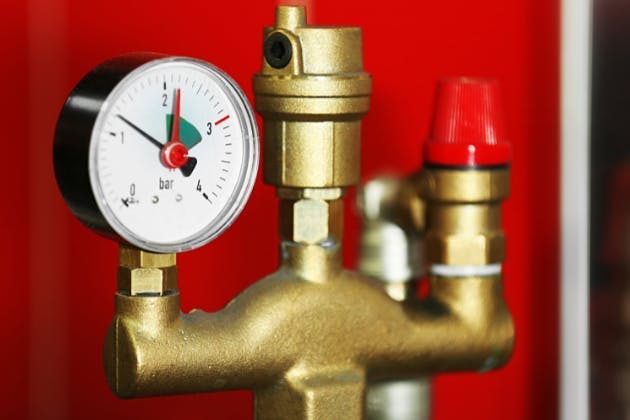Boiler pressure is critical for the proper operation of your heating system. When you realise that the pressure in your boiler is falling, you must act quickly. In this post, we will look at some of the most prevalent causes of boiler pressure loss and the significance of boiler maintenance.

Reasons why your boiler is losing pressure
Faulty Pressure Relief Valve
A defective pressure relief valve is one probable source of pressure loss in your boiler. When surplus pressure exceeds a specific level, this valve is meant to release it. However, if the valve becomes faulty or becomes blocked, it might result in a loss in pressure. If necessary, boiler repair technicians can inspect and replace the pressure relief valve.
Leaking Pipes or Radiators
Leaks in your boiler's system might cause pressure loss. These leaks can happen in pipes or radiators and aren't necessarily evident with the naked eye. Even minor leaks can produce considerable pressure drops over time. A qualified boiler repair professional can find and repair these leaks, keeping the pressure consistent.
Bleeding Radiators
It's fairly uncommon for the boiler pressure to drop after you've recently bled your radiators to eliminate trapped air. When you bleed a radiator, air is expelled from the system, which might cause pressure to drop. However, this transient problem may be readily rectified by topping up the boiler pressure using the filling loop or by contacting a boiler repair professional.
Faulty Expansion Vessel
The expansion vessel in a boiler system is in charge of absorbing extra water as the water in the system heats up. A pressure decrease might occur if the expansion vessel becomes defective or loses its charge. A trained boiler repair professional can inspect the expansion vessel and, if necessary, recharge or replace it.
Water Pressure Regulator
The water pressure regulator maintains a safe level of pressure in the boiler system. Pressure loss can occur if the regulator becomes faulty or malfunctions. To remedy the issue and restore correct pressure levels, a professional boiler repair technician can inspect and adjust the water pressure regulator.
At AllForProperty we are experienced in working on all kinds of boilers and can fix your old boiler so it works like new. We offer a fixed price for our boiler repairs and ongoing maintenance plans, so you can be assured of getting the best deal. If you need our services or have any questions, please contact us by phone at 0121 405 0404.

What to do when your boiler is losing pressure?
Loss of pressure in your boiler can be concerning, but there are steps you can take to solve the problem. If you discover that your boiler is losing pressure, follow these steps:
Check the pressure gauge
Locate your boiler's pressure gauge. It is typically located on the front panel or next to the boiler controls. Keep track of the current pressure reading. When the system is cold, the normal pressure range for a boiler in the UK is between 1 and 1.5 bar.
Re-pressurize the boiler
If the pressure reading falls below the required range, the boiler must be re-pressurized. First, make sure the boiler is turned off and totally cooled. Then, find the filling loop, which is typically a silver flexible hose with a valve at each end that is connected to the boiler or surrounding plumbing. Allow water from the mains to enter the system by opening both valves. Maintain a close eye on the pressure gauge and close the valves when the pressure reaches the required level (about 1.5 bar). Take cautious not to overburden the system.
Check for leaks
Monitor the pressure gauge for a few hours after re-pressurizing the boiler to see whether it decreases again. If the pressure continues to fall, the system may have a leak. Examine visible pipes, radiators, and valves for evidence of water leaking. If you find a leak, contact a qualified boiler repair technician to locate and correct the problem.
Bleed radiators
If you've recently bled your radiators or had any repair done on your heating system, air may have entered the system, producing a drop in pressure. In this instance, bleed the radiators to get rid of any trapped air. Allow the air to escape by slowly opening the bleed valve with a radiator key. Close the valve once water begins to flow steadily. Following the bleeding of the radiators, you may need to re-pressurize the boiler using the techniques outlined above.
Consult a boiler repair specialist
If you've followed the instructions above and the pressure continues to drop, or if you're unsure about conducting any maintenance activities yourself, it's best to contact a professional boiler repair technician. They have the knowledge to diagnose and manage complicated boiler issues, such as pressure loss, and to guarantee that your boiler functions safely and effectively.
Speak to a qualified boiler service team
If you live in Solihull, Birmingham, Tamworth or Sutton Coldfield, then we are the team for you. If you are interested in our boiler repair services, get in touch with us today by calling us on 0121 405 0404 or emailing [email protected]. You can also contact us by filling out a contact form.

